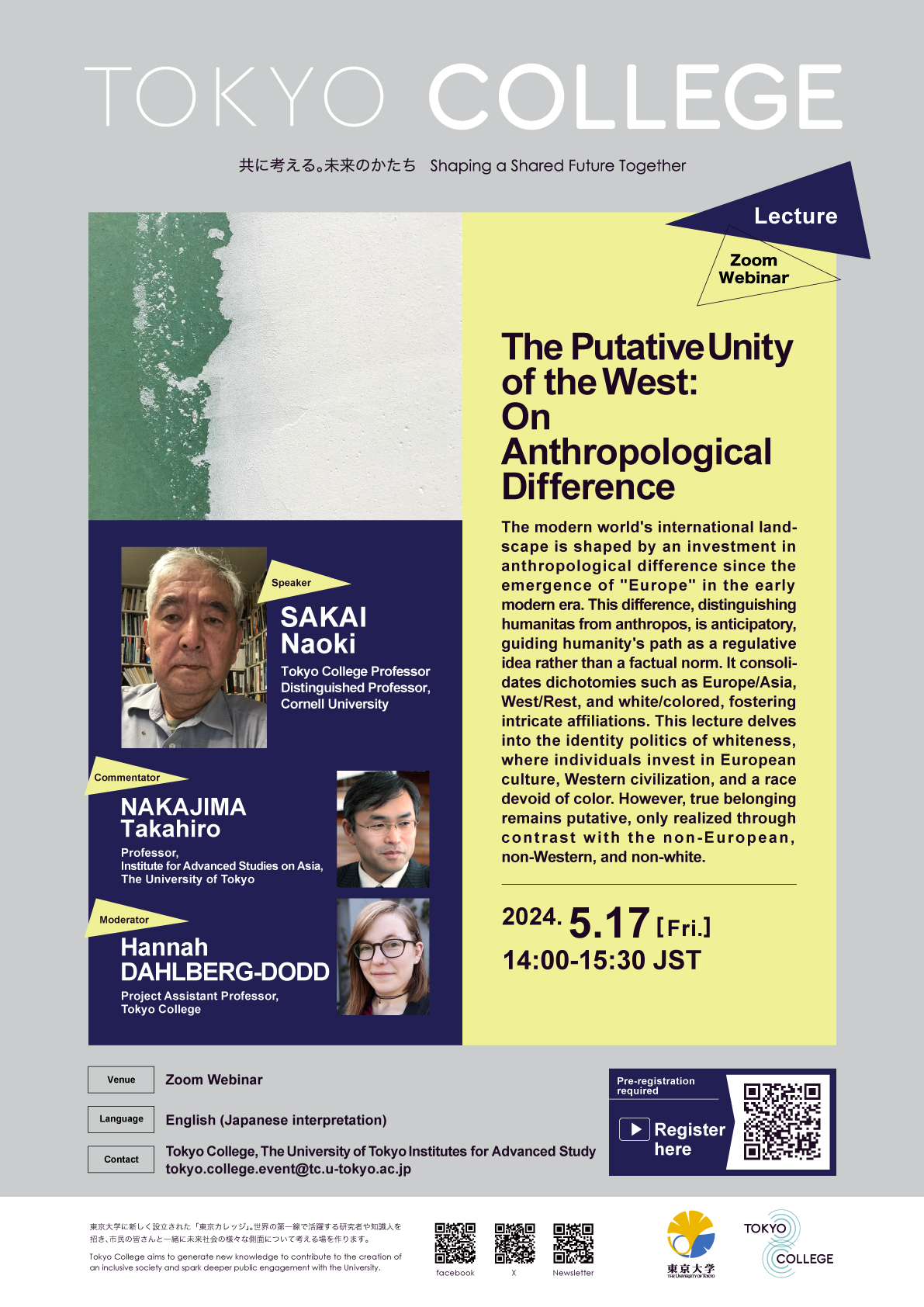The Putative Unity of the West: On Anthropological Difference (Lecture by Prof. SAKAI Naoki)

| Date(s) | Friday, 17 May 2024, 14:00-15:30 pm JST |
|---|---|
| Venue |
Zoom Webinar (Register here) |
| Registration | Pre-registration required |
| Language | English (Japanese interpretation) |
| Abstract |
The modern international world has been regulated by an investment in anthropological difference since the early modern period when a geopolitical sphere called “Europe” emerged. This anthropological difference is neither a norm nor an empirically verifiable fact; rather it is an anticipation or desire for one kind of humanity, humanitas, to be distinguished from the other kind, anthropos; this cannot be determined as a fait accompli at any moment since it is an expectation or anticipation that must be actualized. In this respect, it is never in the present, but rather in the future anterior. It serves as a sort of regulative idea or schema of the world that guides the progress of humanity, rather than as an observable law that determines the classification of humanity at some specific moment in history. Nevertheless, this investment in anthropological difference has served to socially consolidate such dichotomies as Europe and Asia (Africa, the Americas, etc), the West and the Rest, and the white (non-colored) and the colored. Europe, the West, and whiteness (colorless) are all so overdetermined that they do not cohere even in any one single register ⎯ not to mention their multiplicity ⎯ yet it is also widely upheld that historically, geopolitically, socio-economically, and bio-politically, Europe, the West and whiteness are somewhat affiliated with one another. The network of tropic affiliations among Europe, the West and whiteness is very complex, contingent and constantly changing, so I will not venture to subject this network to exhaustive analysis in this lecture. What I would like to outline instead is the identity politics of whiteness according to which an individual identifies him or herself with Europe, the West or whiteness by investing in the desire for European culture, Western civilization and an invisible race that is somewhat free of color coding. Yet, Europe, the West or whiteness is never more than putative; an individual can never be adequately European, Western or white on the grounds of empirical evidence; it is only through the performance of contra-distinction to what is not Europe, what is not the West, and to what is not white but colored, that one can identify with any of these. |
| Program |
Speaker SAKAI Naoki (Tokyo College Professor, Distinguished Professor of Arts and Sciences at Cornell University) Commentator: NAKAJIMA Takahiro (Professor, Institute for Advanced Studies on Asia, The University of Tokyo) Moderator: Hannah DAHLBERG-DODD (Project Assistant Professor, Tokyo College) |
| Speaker Profile |
Naoki Sakai is Distinguished Professor of Arts and Sciences in Asian Studies Emeritus at Cornell University. He used to teach in the departments of Asian Studies and Comparative Literature, and the graduate field of history and the graduate faculty of feminism, gender and sexuality studies until he retired in July 2021. He has published in the fields of comparative literature, intellectual history, translation studies, the studies of racism and nationalism, and the histories of textuality. His publications include: The End of Pax Americana – the Loss of Empire and Hikikomori Nationalism(Duke University Press, 2022);Nationalism of Hikikomori (Iwanami Shoten, 2017); Japan/Cinematic Images/US,(Ibunsha, 2007); Translation and Subjectivity (University of Minnesota Press, 1997); The Stillbirth of the Japanese as a Language and as an Ethnos (Shinyô-sha, 1995); Voices of the Past-the status of language in eighteenth-century Japanese discourse (Cornell University Press, 1991) and many others. He edited a number of volumes including Politics of Translation, special issue of Translation, co-edited with Sandro Mezzadra (2014); The Trans-Pacific Imagination co-edited with Hyon Joo Yoo (World Scientific, 2012); The End of Area, special issue of positions asia critique (Duke UP, 2019). Naoki Sakai served as the founding editor for the project of TRACES, a multilingual series in five languages – Korean, Chinese, English, Spanish and Japanese. |
| Organized by | Tokyo College, The University of Tokyo |
| Contact | tokyo.college.event@tc.u-tokyo.ac.jp |















